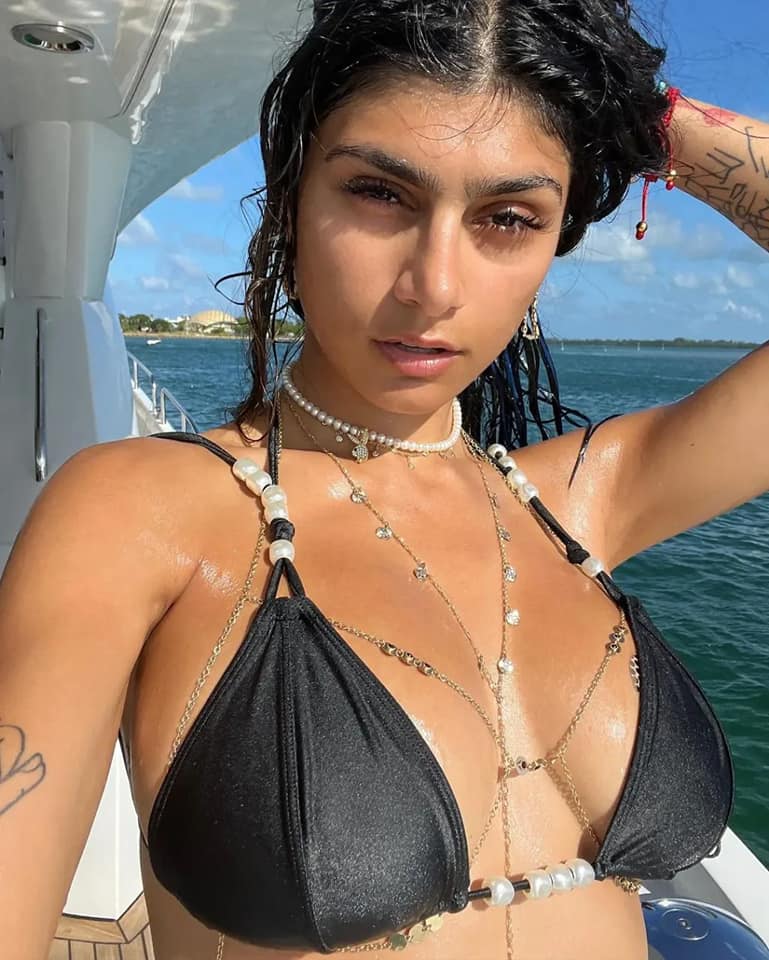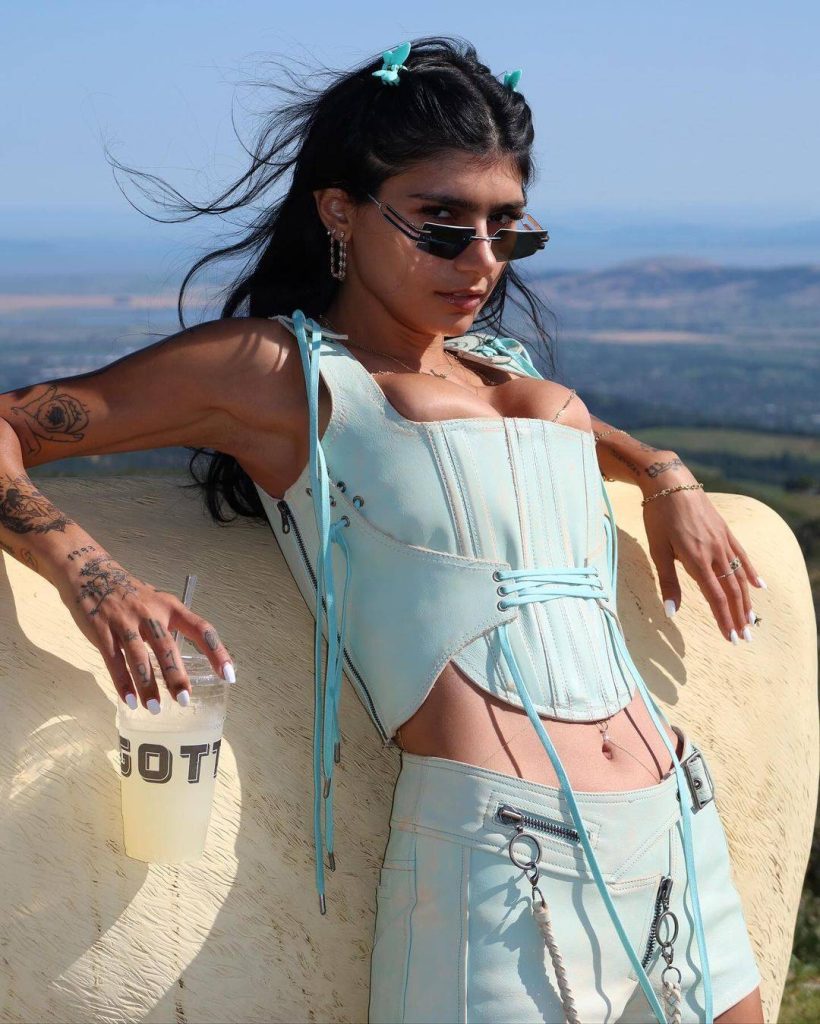Introduction to Mia Khalifa’s Story
Mia Khalifa’s biography, life, career, present encapsulates a journey marked by controversy, transformation, and influence. Born in a conservative Middle Eastern household and later rising to global notoriety, Mia Khalifa has become a name recognized far beyond the confines of her past industry. Her evolution from a short-lived adult film career to becoming a social media personality, entrepreneur, and commentator is a narrative of reinvention, resilience, and reclaiming one’s own story.

Early Life and Cultural Background
Mia Khalifa was born on February 10, 1993, in Beirut, Lebanon, amidst the unrest of the Lebanese Civil War’s aftermath. In 2001, at the age of eight, her family immigrated to the United States, settling in Montgomery County, Maryland. Raised in a strict Christian household, Khalifa attended a private French-language school in Beirut before transitioning to the American education system.

She was an academically driven student and later pursued a Bachelor’s Degree in History from the University of Texas at El Paso. Her deep interest in historical contexts, politics, and culture was evident early in her life, contradicting the public persona that would later dominate her image.
The Controversial Rise in Adult Entertainment
In 2014, Mia Khalifa entered the adult film industry. Her debut coincided with a scene that stirred worldwide controversy — one that involved her wearing a hijab, a sacred religious symbol. This single video, while propelling her to the top of adult site rankings in a matter of weeks, also sparked outrage, especially from the Middle Eastern community. The backlash was severe, including threats and condemnation from religious and political entities.

Despite her brief tenure—just over three months—Khalifa became one of the most searched-for names in adult entertainment history. She has stated numerous times that her involvement in the industry consisted of only a handful of scenes, a fact often overlooked amid the public fixation on her image.
Life After the Industry: Reclamation and Advocacy
After exiting the adult industry in early 2015, Mia Khalifa faced significant challenges. Her past followed her relentlessly, impacting her personal relationships, career opportunities, and mental well-being. Determined not to be defined by a three-month period of her life, Khalifa embarked on a journey to rebuild her identity and reclaim her narrative.

She became a vocal critic of the adult industry, speaking out about lack of agency, exploitation, and the permanence of digital content. Her candidness about the long-term effects of her choices has resonated with many, especially young women navigating the pressures of online culture and fame.
Social Media Influence and Online Persona
Mia Khalifa transitioned successfully into a social media personality. With millions of followers across Instagram, Twitter (now X), and TikTok, she has crafted a persona rooted in humor, cultural commentary, fashion, and lifestyle. Her ability to merge wit with advocacy has earned her a dedicated audience.

She uses her platforms to discuss Middle Eastern politics, feminism, body positivity, and online censorship, while also engaging in lighthearted content that showcases her personality beyond her controversial past. Her authenticity and willingness to discuss taboo topics have made her a relatable and compelling figure.
Business Ventures and Entrepreneurship
Mia Khalifa has leveraged her fame into a variety of entrepreneurial efforts. One of her most notable ventures includes a partnership with OnlyFans, where she offers exclusive content—not adult-oriented, but personal and lifestyle-focused. This platform has allowed her to monetize content on her own terms, giving her control over her brand.

In addition, Khalifa has collaborated with fashion brands, eyewear lines, and charity campaigns, highlighting her role as an influencer and businesswoman. Her focus remains on promoting sustainability, self-love, and independence, often sharing personal stories that underscore her growth.
Public Appearances and Media Contributions
Over the years, Mia Khalifa has appeared on several talk shows, podcasts, and interviews, discussing everything from sports to social justice. A passionate fan of sports—particularly hockey and football—she has provided commentary for sports platforms and YouTube channels, blending her personal interests with media presence.

Her interviews often focus on the psychological toll of public shaming, the importance of consent in digital spaces, and the need for better support systems for those leaving the adult entertainment industry. These appearances have further established her as a thoughtful and articulate voice in cultural conversations.
Current Life and Personal Growth
Today, Mia Khalifa resides primarily in Los Angeles, continuing to expand her influence across industries. She has embraced therapy and openly discusses her mental health journey, hoping to destigmatize seeking help and healing from trauma.

Her current life is marked by a balance between public advocacy, personal creativity, and private growth. She shares glimpses of her daily life with followers, from cooking and fashion to travel and activism, fostering a community rooted in transparency and respect.
Legacy and Ongoing Influence
Despite being active in the adult industry for a fleeting moment, Mia Khalifa’s name continues to spark dialogue. Her story is a stark illustration of the double standards, societal hypocrisy, and power of digital permanence. Yet, rather than allow that period to define her, she has continuously reshaped her legacy.
Khalifa’s biography is one of transformation—from an individual caught in the viral machinery of the internet to a woman reclaiming her space and influence on her own terms. Her journey offers lessons in accountability, resilience, and the complex realities of internet fame.

Conclusion: Redefining Identity in a Digital World
Mia Khalifa’s biography, life, career, present collectively illustrate a modern tale of rebirth in the digital age. What began as a controversial and misunderstood chapter has become the foundation for advocacy, awareness, and entrepreneurship. Khalifa stands today not merely as a public figure but as a symbol of reclamation and resilience.
Her voice continues to challenge norms, educate others, and inspire individuals navigating the complexities of identity in an era where a single decision can echo indefinitely. Mia Khalifa’s story reminds us all that while the internet never forgets, it can also be a place of healing, growth, and reinvention.


